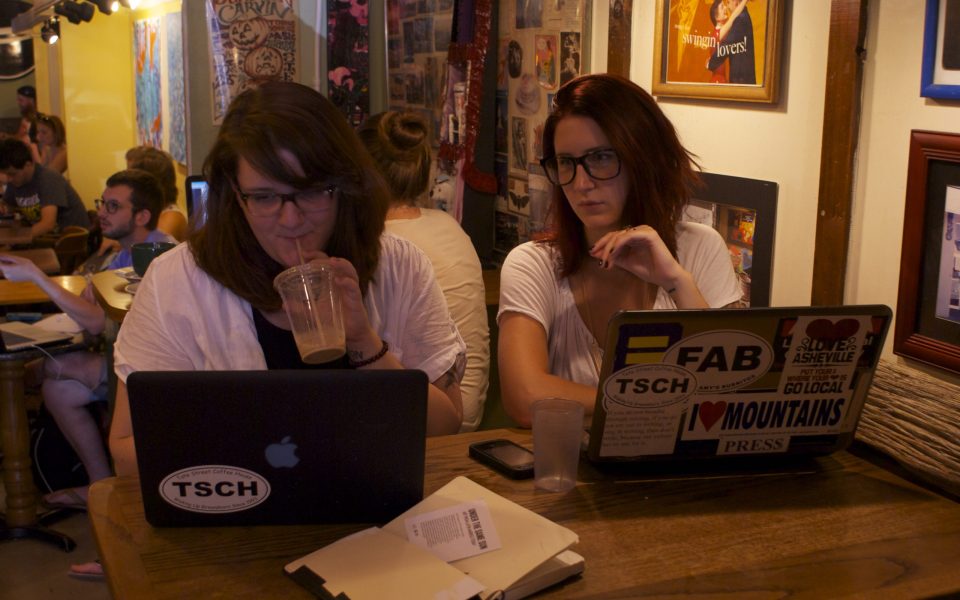by Eric Ginsburg
It all began with two questions.
While Nadia Stevens, now a senior at UNCG, was participating in the New York Arts Practicum this summer, her mentor would regularly pose existential questions to her. Jen Liu, who used to teach at Oberlin College and Conservatory and is now at Parsons the New School for Design, helped shift Stevens’ perspective on the art she was making and catalyzed a transformation in her focus.
“She asked me once if my peers or I were making political work,” Stevens said, “and the answer was no.”
Stevens, who is pursuing a bachelor of fine arts and had intended to head into a master of fine arts program afterwards, realized that she was part of a trend of very individualistic artwork. The art that she and her peers were producing was about their own feelings or families, art that was really for themselves or simply art about art.
Then Liu asked, “Who is art for?” Stevens realized she needed a radical change.
The question still echoes regularly in her mind, and her tangle of enthusiasm is visibly apparent as Stevens describes where she’s directing that billowing energy.
The plan is still in the evolution process — Stevens and co-conspirator Rebecca Harrelson officially decided on naming it the “Matter Factory” on Tuesday — but the basics are already nailed down.
Frustrated by traditional and arbitrary divides between artistic mediums, be they sculpture and painting or visual art and music, Stevens and a small cohort of people affiliated with UNCG aim to create an intersectional artist collective. The Matter Factory, which will initially be based out of Stevens’ Latham Park home, will eventually relocate to a physical space once funding is secured.
Stevens debunked several myths about art during her time at the practicum in Brooklyn. Among them was the notion that artists need to move to New York to make it, that making art should be an individualistic pursuit and that traditional paths involving higher education and gallery shows are the best way to be commercially viable.
“I just got to meet a bunch of people who broke all the rules, and I’m just going to go for it,” she said, referencing artist spaces including Flux Factory and her experience meeting the beer-drinking twentysomethings littering Kickstarter’s office.
Stevens is midstream, reaching out to experienced artists and potential collaborators, and has been overwhelmed by the response so far. Sean Joseph Patrick Carney, who runs Social Malpractice Publishing in New York, sent her a two-page response email stuffed with ideas and advice. Stevens, surprised and flattered, printed it out and put it up on her wall.
She also has a meeting planned with Elsewhere co-creator Stephanie Sherman at the end of this month, and has received positive feedback from UNCG professor Barbara Campbell. Stevens plans to reach out to people at Guilford College and other area schools next.
Harrelson, an English major at UNCG, quickly latched onto the idea. Though she writes for the Carolinian student newspaper, Harrelson said most of her writing doesn’t have an outlet and that she is drawn to Stevens’ uninhibited and cross-genre approach.
“I’m trying to harness this,” Harrelson said, gesturing to Stevens and the invisible energy she exuded, “so that she doesn’t run out of fuel.”
With help from a small band of core people, the Matter Factory will encompass literature, visual art, music and performance, Stevens said. The duo wants to create a middle ground between art being displayed in coffee shops and bars and stuffier, more staid galleries.
The idea is to be nontraditional both in approach and in the art, encouraging collaboration while providing an accessible outlet to people regardless of their formal training in a medium. Stevens likes to emphasize the term “cultural producers” to describe their efforts.
Their goal is to create an inclusive space from which artists can build, a space that works collaboratively and encourages interactions between artists, viewers and the Matter Factory directors.
“Basically I want no one to be ineligible,” Stevens said.
Their goal is to show the first exhibit, launched with an event and accompanying publication, in the spring, but if the idea takes hold they agreed it would be a reason to stay in Greensboro.
“I think this is something that Greensboro has needed for a really long time,” Harrelson said. “The really big thing is, why not do it?”
Contact the Matter Factory via Nadia Stevens at [email protected] or 919.891.0887.
Join the First Amendment Society, a membership that goes directly to funding TCB‘s newsroom.
We believe that reporting can save the world.
The TCB First Amendment Society recognizes the vital role of a free, unfettered press with a bundling of local experiences designed to build community, and unique engagements with our newsroom that will help you understand, and shape, local journalism’s critical role in uplifting the people in our cities.
All revenue goes directly into the newsroom as reporters’ salaries and freelance commissions.


Leave a Reply